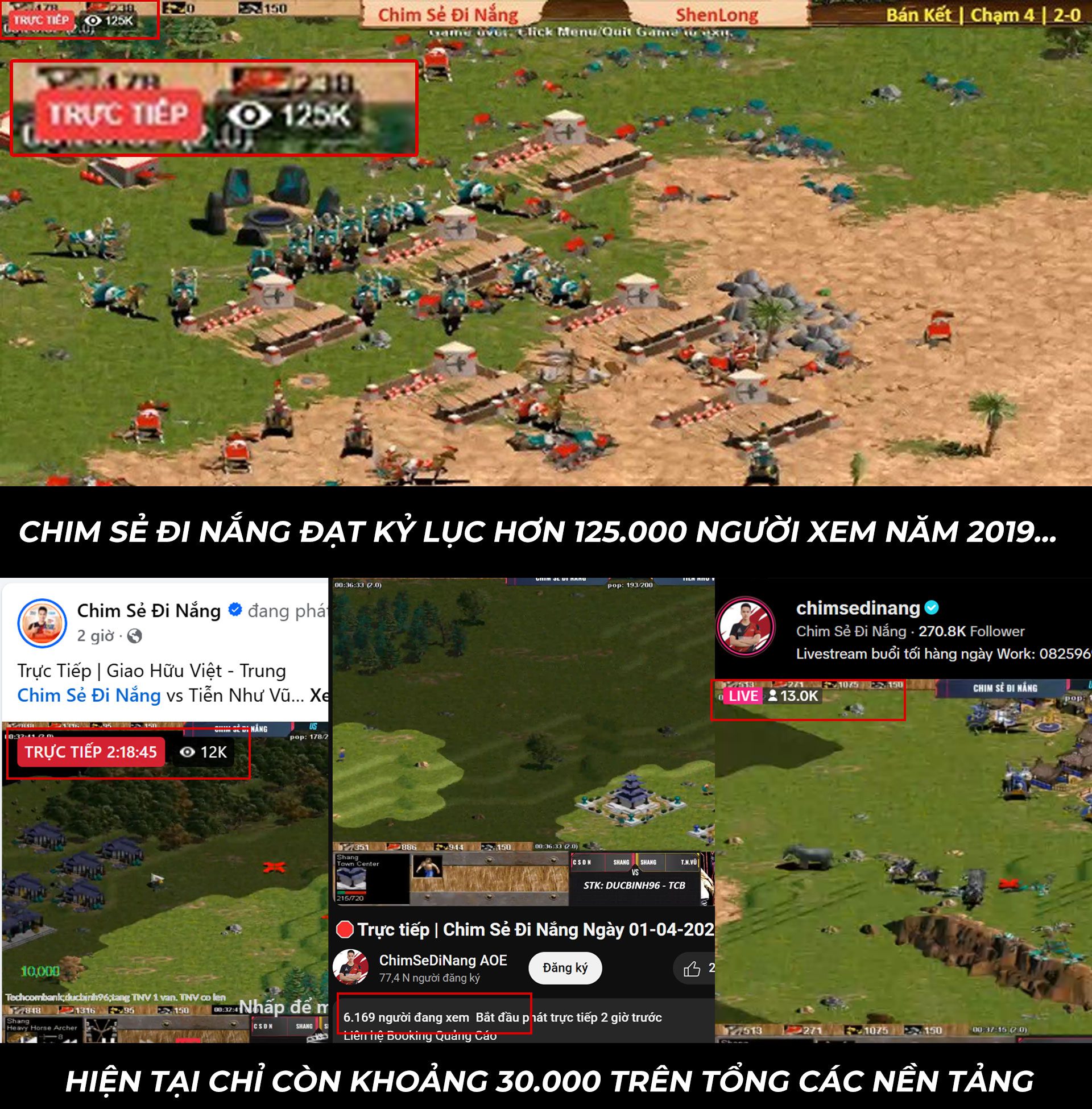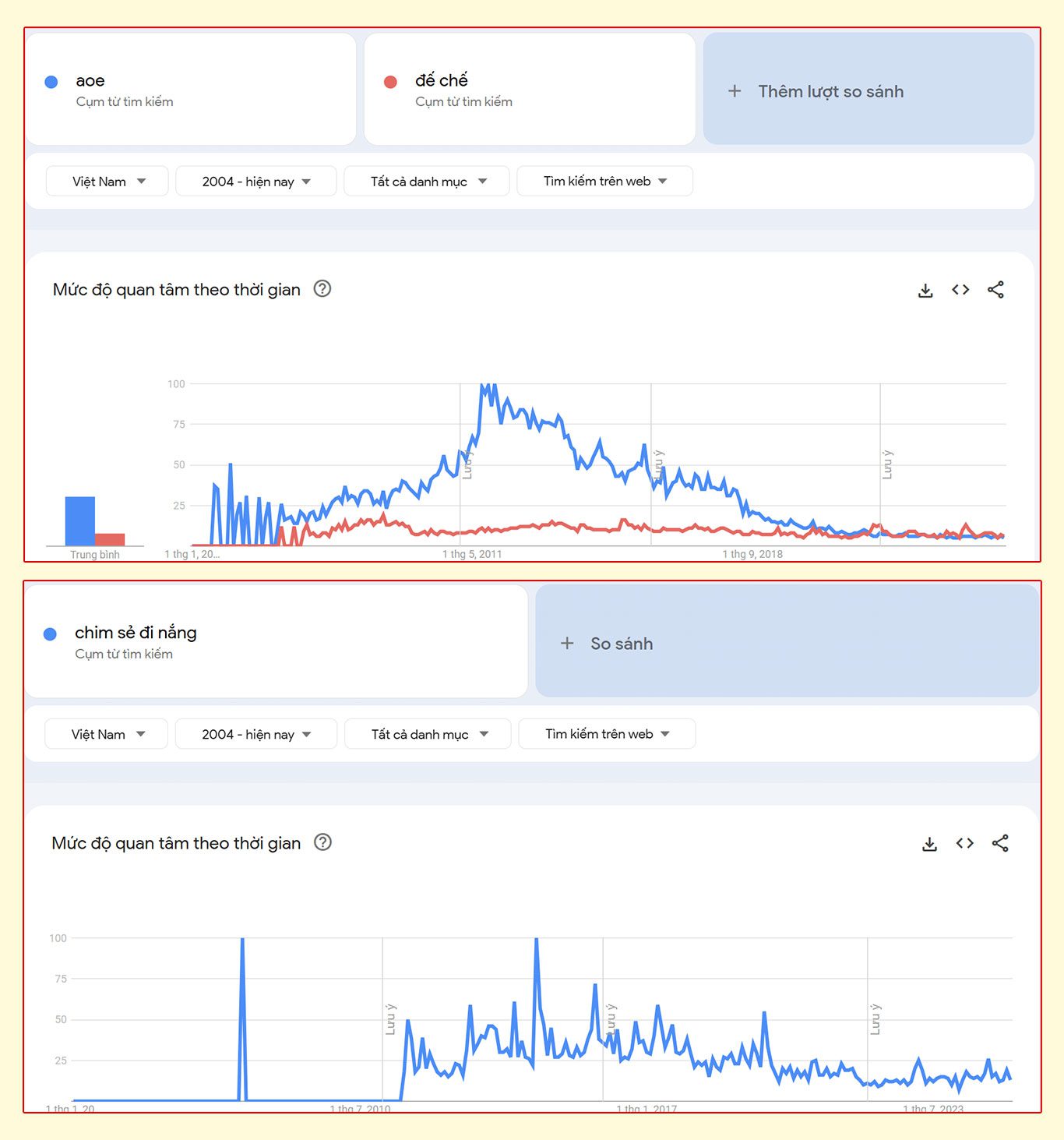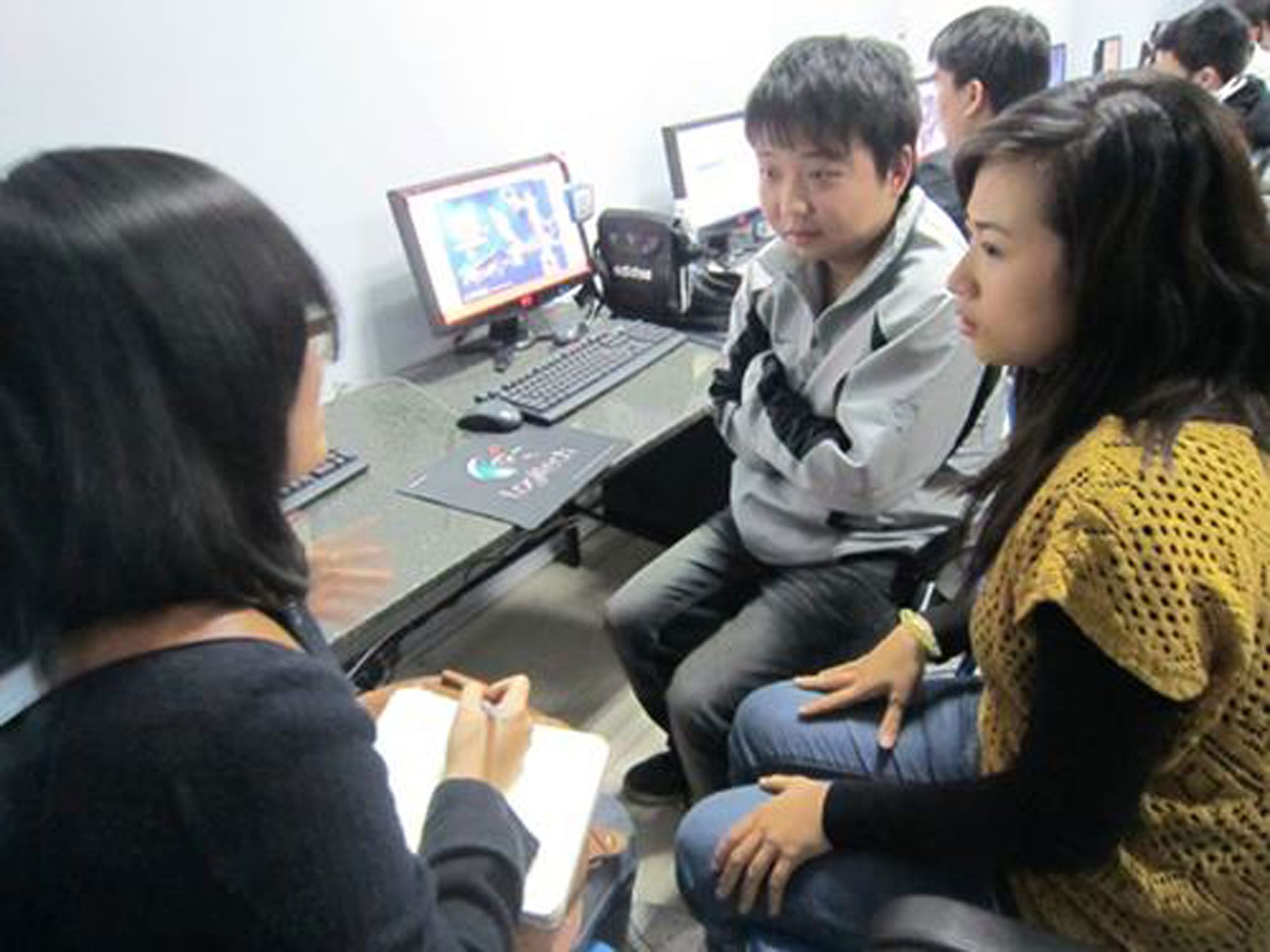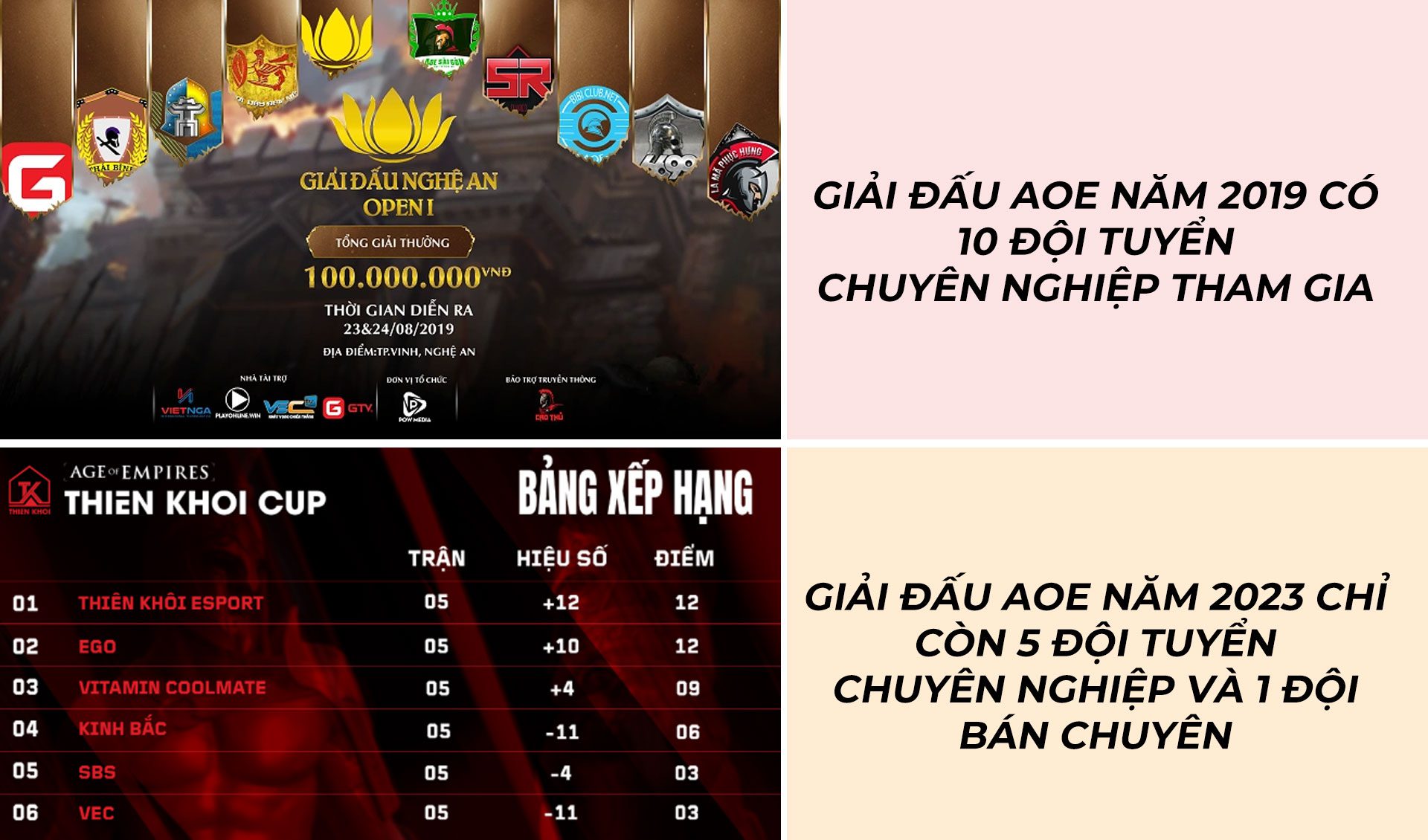In Vietnam and China, Age of Empires (AoE) is not just a game that creates a trend at internet cafes, but it has also developed into a professional esports discipline, attracting millions of players and fans. However, the development of AoE has stagnated, if not regressed.
In reality, the audience for AoE is decreasing day by day. While 2019 was seen as a golden age for AoE in Vietnam with the rise of Facebook Gaming, the viewership during the Age of Empires Vietnam-China tournaments peaked at nearly 2 million viewers, with a record of 125,000 people watching live on Facebook. However, currently, the number of viewers for live streaming or rewatching videos has significantly decreased compared to its golden era.

In addition, Google search statistics show that the search demand for “AoE” and “De Chen” is declining sharply. The peak search for the keyword “AoE” was recorded in November 2011 and has been steadily decreasing since then. Conversely, the period when AoE thrived on the internet was marked by the Age of Empires GameTV Lenovo Cup 2011, which is considered the first Vietnam-China tournament in the history of the AoE community, creating a strong emotional connection among fans and paving the way for the AoE community to thrive and advance to professionalism. However, since then, the search frequency for “AoE” has shown a declining trend, particularly starting in 2020. The increasing interest in related keywords such as “Chim Sẻ Đi Nắng” or “Hồng Anh AoE,” “Bibi AoE,” reflects a shift in community interests.

Not only has the number of searches diminished, but the appeal of AoE on major gaming and sports platforms is also waning. Previously, social media platforms used to frequently share news about AoE, especially during the Vietnam-China tournaments. Therefore, the current statistics reveal a rather disappointing reality; has AoE lost its allure for audiences compared to the past?

Despite the current challenges, the Vietnamese AoE professional community is still facing significant obstacles in building a sustainable development ecosystem. The income from AoE is quite meager, forcing many professional players to seek alternative careers or shift to other fields. Previously notable players such as Tiểu Bạch Long, meomeo, Tom, Việt BM, Võ Thường, and Mũ Đỉnh, along with the latest additions like VaneLove, Nam Sociu, Văn Hưởng, Tệu, etc., have seen a dramatic decline in the number of active players. This decline emphasizes that professional teams must consolidate their scope. In 2019, there were about 10 active professional teams in AoE Vietnam, each having official members and 2-3 additional players. By 2024, this number is expected to dwindle to just a few, even to the point where some teams might consist of only four members to compete.

As the number of professional players continues to diminish, the AoE community is struggling to find a viable path forward. The number of players still actively participating in AoE is very low, but the talent pool remains even scarcer. Over the years, the community has only recognized and nurtured a single prominent talent, Vũ Ngọc Luân (nickname 2k1 Bắc Ninh). Despite numerous tournaments searching for talent, the AoE Vietnam scene is still “thirsty” for new talent and is entirely reliant on players from the 1990s generation. Is it not surprising that the appeal of AoE is much lower than other titles in the current gaming landscape?
What Causes the Decline of AoE?
Like many other competitive online games, AoE cannot escape the harsh realities of the gaming industry. The primary reason for AoE’s decline is the fierce competition from other emerging games. With an increasing number of new games entering the market with engaging gameplay and better graphics, many players have shifted away from AoE to seek new experiences. On the other hand, while AoE’s gameplay isn’t overly complicated, its high demand for patience has unintentionally become a barrier for many new players trying to engage.
Moreover, the game has not been updated significantly over the years, making it difficult to attract new players amidst a landscape of diverse choices. However, deeper issues also directly impact the community’s decline in Vietnam, which are primarily related to professional AoE itself. The core issue lies in two words: “income.”
Previously, the period from 2018 to 2020 was considered the golden era for AoE games, as companies invested heavily, leading to high income and significant integration with Facebook Gaming. However, after this period, Facebook Gaming’s platform began to decline, cutting revenues, and to date, there is no longer a sustainable income for streamers. This is why companies face significant challenges, while the income from AoE games continues to decline, making life increasingly difficult. Consequently, many professional AoE players have to seek alternative jobs to maintain a decent income.
Of course, outside of Facebook Gaming, professional AoE in Vietnam still receives investment from large sponsors and brands. Annually, there are many grand tournaments with a prize pool reaching several hundred million VND or even larger. However, the concerning aspect is the disproportionate distribution of resources in these tournaments. While the champions may receive significant prize money, other participating teams often leave with very little profit, and some teams may not receive anything at all after the tournament. This situation runs counter to the development principles where any tournament aims to be successful through the contributions of the participating teams.
Looking at League of Legends and other esports disciplines, it is clear that all participating teams in professional tournaments share the prize pool. This model allows each team to sustain itself while simultaneously fostering the overall growth of the community. However, this is a model that the professional AoE scene in Vietnam has yet to achieve.
The difference in development strategies between AoE and League of Legends is apparent, as the search volume for “AoE” continues to decline since 2011, while 2012 marked the arrival of League of Legends in Vietnam, opening new doors for esports in the country. In contrast, the misalignment of AoE has led to the decline of the community, with the quality of tournaments decreasing and the enthusiasm of fans waning.
How Can AoE Revive?
Despite facing many challenges in a competitive gaming environment, the reality is that AoE remains a game with enormous potential for development. Over nearly three decades, this game has built a passionate community of fans. However, to regain its former glory, AoE must address the issues that hinder its growth. The main issue is: the income of all games.
One of the sources of income that must be prioritized and effectively exploited is through professional tournaments. Thus, AoE tournaments have always been a focal point of interest for the community and are vital for attracting sponsorship. If companies can collaborate to organize high-quality tournaments with a significant scale, it will create a sustainable ecosystem that can attract new sponsors. This also implies that the income of games participating in tournaments must increase.
However, as previously mentioned, while AoE professional tournaments generate high profits, it is essential to distribute the income equitably. Any game participating in tournaments must receive proportional income in line with its contributions to the event. Avoiding situations where champions earn excessive rewards while those who “make the game” are left with minimal recognition is crucial.
Ultimately, solving this equation is not a simple matter. For many years, the professional AoE scene in Vietnam has been accustomed to a declining path, lacking a stable foundation. This is also a core reason why organizations like Thiên Khôi Esports are seeking different approaches to better align with the community. The solution is to introduce concepts like “Image Rights Sale” or “Broadcast Rights Sale” in professional AoE tournaments. In fact, it doesn’t have to be a massive overhaul; it can simply be applying the “profit-sharing” model used in esports (League of Legends) or football (Premier League, Champions League, etc.) to create a source of income that is sustainable for all AoE games. Clearly, Thiên Khôi Esports understands that only when AoE games have higher income and better living conditions will they attract more players and ultimately lead to a sustainable ecosystem.
In summary, AoE will always remain a legendary tactical game. However, if AoE Vietnam cannot resolve the issues hindering its growth and cannot attract sponsors and resources equitably to foster overall development, this game will struggle to maintain its stature. Moreover, if no changes are made, in the end, AoE may simply become a symbol of nostalgia, as it is often said that no one can live forever with memories alone.




















